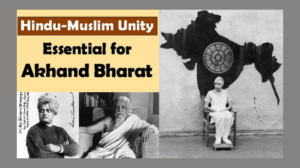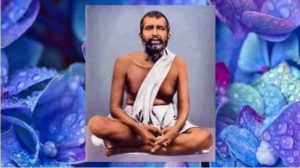
The below post written by John Schlenck was published in the American Vedantist Magazine, Vol. 9, No. 3.
As Sri Sarada Devi lay on her deathbed, a woman disciple who had known Sri Ramakrishna came to her, weeping, and lamented, “What will happen to us, Mother?”
Holy Mother replied, “Why should you be afraid? You have seen the Master. What should frighten you?”
Then she continued, very slowly, “Let me tell you one thing, my child. If you want peace, do not look into anybody’s faults. Rather look into your own faults. Learn to make the world your own. No one is a stranger, my child; the whole world is your own.”
The words are deceptively simple. But as we continue to contemplate their meaning, they seem more and more profound. One’s whole spiritual life can be based on these words. Indeed, they express a universal spirituality for our time.
One thing we notice is that the words are totally practical. There is no theology here, not even a mention of God or soul. Anyone in any tradition can relate to them and benefit by them. They tell us what to do to gain peace of mind, peace that “passes understanding.”
Beyond this, they also show a way to achieve peace in the world, peace in society, human survival, even the health and survival of our planet. Is this too much of a stretch? Let us see.
Connect your consciousness with the Infinite Consciousness of God-realized sages. Subscribe to daily quote broadcast via WHATSAPP OR INSTAGRAM OR TELEGRAM
“Why should you be afraid?”
Holy Mother first assured the disciple that she had no cause for fear. This she told all her disciples. They had all come to her and been accepted by her and by Sri Ramakrishna.
Therefore they had no cause for fear. She was always anxious to dispel any fear in her disciples’ minds. Spiritual life was not to be based on, or obstructed by, fear.
“You have seen the Master.”
God, Atman, Brahman, may be abstractions to us. But for those who saw Holy Mother, Sri Ramakrishna and his disciples, or Jesus, Buddha, Chaitanya and their disciples, religion was an experienced reality.
Some of us have been blessed by meeting disciples of Holy Mother, Swami Brahmananda, Swami Shivananda, by seeing lives that were spiritually transformed. But even if we as individuals haven’t met illumined souls, humanity as a whole can be said to have seen them.
Admitting that much of what is written about them is pious exaggeration, there is a spiritual kernel, a spiritual power, beauty and knowledge that can’t easily be dismissed.
It is historical fact that their lives had profound effects on innumerable human beings. Their teachings, if followed into practice, can transform our lives and our societies. Knowing this gives us faith in the human potential, in our own potential.
“If you want peace. . .”
Do we want peace? In some sense we all want peace. Constant fighting and friction are painful and wear us out. But much of the time we want other things—excitement, pleasure, power, wealth.
And even when we want a break from those pursuits, we seek peace outside ourselves, by going to a different place, associating with different people.
But do we want real, lasting peace, the peace that passeth understanding, the “perfect peace” attainable by a “mind stayed on God”? Holy Mother tells us how to attain that peace:
“. . . do not look into anybody’s faults.”
On first hearing, this sounds too simple. Supposing I don’t find fault with my neighbor, aren’t there many other things that can and do interfere with my peace of mind?
Let us examine more closely. What is required not to find fault with others? We have to put aside our own desires, prejudices and judgments and develop sympathy and understanding for the other.
We have to try to see things from the standpoint of the other person, putting oneself “in the other person’s shoes.” The other person is after all a fellow human being deserving the same respect and having the same intrinsic value as ourselves. Easy enough to say. But how to practice?
“Rather look into your own faults.”
To see the other person without anger, hatred or desire, we have to work on our own minds, to purify ourselves. Well and good, we may reply. We are already doing spiritual practice, trying to develop love for God. And still we get irritated and find fault with others.
The question is, do we really want to overcome our own shortcomings? Are we really dissatisfied with our own untransformed character, do we dislike feeling angry, being prejudiced and unsympathetic? Or are we addicted to getting angry, being mean and irritable, justifying our own behavior, blaming others for our misfortune? If so, what is the way out?
“Learn to make the world your own.”
Holy Mother did this to the fullest degree. She once said, “Beings all over the universe are my children.” Another time she said, “I do not know anyone, even an ant, for whom I do not feel compassion.”
She cautioned patriotic disciples yearning for Indian independence not to hate the British people, saying, “They, too, are my children.”
How can we learn to feel that all people are our brothers and sisters? News media every day bring us images of people in different parts of the world experiencing joy, sorrow, pleasure, pain.
Is it so difficult to feel that they are human beings like ourselves, with the same feelings, the same hopes and fears? Grief at the loss of a loved one is the same all over the world.
When we see images of grieving people, rather than thinking of them as members of some group which we may like or dislike, we can try to see them as individual people like ourselves, born into a complex and difficult world, buffeted and shaped by circumstances beyond their control.
But what about the people we interact with on a daily basis? As the saying goes, “Charity begins at home.” How can we overcome disliking certain persons, seeing them as potential or actual enemies?
This requires seeing ourselves and others in a different light. The goal is to “see all beings in the Self and the Self in all beings.” (Gita, VI.29) But for most of us, this scriptural formula, however beautiful, is an abstraction, even a pious cliche. How do we get from here to there?
Humility and Service
Holy Mother’s life is full of helpful suggestions. Two things that stand out are humility and an attitude of service. Whoever came to her she wanted to serve. She once said to a disciple, “Please bless me that I may continue to serve others as long as I live.”
Can we imagine the degree of humility behind these words? She is asking her own disciple to bless her! And, having reached the highest spiritual realization herself, with no reason to go on working, she nevertheless wants to continue to serve others as long as she lives.
But rather than remaining transfixed in wonder, let us see what we can learn for our own lives. How can an attitude of mutual suspicion and dislike between oneself and another person be changed? Often these attitudes are built up over a period of time, during which resentment and a feeling of being wronged go on increasing.
Even an attempt to be friendly and understanding to someone with whom we have a negative relationship can seem forced and be met with suspicion.
Rather than trying to work things out through words, when our motives are suspect, we can try to find an area in which the other person has some need, and then render some service, and go on rendering that service out of concern for that person, without asking for any service in return.
Instead of focusing on how we are treated by that person, how unlikeable or disagreeable that person is, our attention gradually shifts to concern for that person’s happiness and what we can do to contribute toward it.
In this way, dislike can gradually be replaced by concern. And with such concern on our part, there is a very good chance that the other person will become less hostile to us. But we must first want to overcome our suspicion, dislike and fault-finding.
Though it may be hard for us to imagine Holy Mother having to struggle with such feelings herself, it is a matter of record that she did pray to overcome the habit of fault-finding.
If even she is not too great to utter such a prayer, can we afford to think ourselves beyond the need for it? When we are struggling with our weaknesses, prayer is not only helpful but necessary and often comes spontaneously.
“No one is a stranger, my child”
By developing concern for the other person, we gradually come to feel that that person is not a stranger, that he or she is “our own.” And by struggling to overcome our own feelings of dislike, anger, suspicion and prejudice, we become aware of just how difficult it can be to overcome such feelings.
We become sympathetic to others who are suffering from the same handicaps. We find that we are all struggling with similar weaknesses, with similar ignorance of our real nature.
Also, by engaging in the struggle and gaining a sense of camaraderie with others, of not being strangers, we can begin to get a handle on what real love and unselfishness mean, of feeling that all persons are our “own.” We attenuate the wall of selfishness that separates us from others and come closer to seeing the Self in all beings.
The Order of the Teaching
The order of the teachings in Mother’s last message is significant. First, proceed in our spiritual lives without the paralysis of fear. Then learn not to see the faults of others. This will necessitate seeing and acknowledging our own faults and struggling to overcome them.
The difficulty of doing this will make us more sympathetic to others; we realize that we are all in the same boat, each struggling with one’s own mind.
Then we can begin to feel that we are not strangers to any person, that all persons in the world are comrades in the same struggle with the same human weaknesses and foibles. But we also find that these weaknesses can gradually be overcome.
The truths of spiritual life seem less abstract, and we are convinced that some day we may truly know that the whole world is our own.
When we directly experience that no one is a stranger and that the whole world is our own, we will have reached the nondual truth.
This is on the individual level. But there are profound implications for the larger human society and the world as well.
“The whole world is your own.”
It is almost a cliché nowadays that as the world becomes more and more interconnected physically and economically, there must be a corresponding moral and spiritual interconnection. With modern technology, if we do not overcome greed, violence, hatred and unbridled passion we will destroy ourselves and all life on this uncommonly blessed planet.
How do we go about actually developing such a spiritual interconnection? By feeling and knowing that we are not strangers, that we share a common humanity—we all hope, we all suffer, we all struggle, we all experience joy and sorrow, and we are all heirs of great cultural and spiritual riches.
But also by feeling and knowing that the world is our own, not something strange and alien to be conquered and exploited. We have a responsibility for this beautiful and fragile world we live in. We are one with it, it is one with us.
Even If We’re Not All Perfect…
All beautiful sentiments, one may object; but they remain a matter of faith and are not yet realized by us. If we have to wait until all persons have overcome their imperfections, it will be too late. The planet with all its life will be destroyed.
But history shows that great things can be achieved even without all persons being perfect, that, even without direct God-realization, faith (whether in ourselves or in God or both) can move mountainous obstacles.
Gandhi and Martin Luther King Jr. had their foibles but nevertheless achieved moral breakthroughs in their time and place that continue to resonate today. If there are a sufficient number of people of courage and good will, much can be achieved.
Today there are many people of good will working toward an inclusive view of common humanity and for the protection of the planet. There are also many sources of spiritual inspiration for these people.
We would like to see Holy Mother’s message and clear vision more widely known and practiced and the potential of its contribution more fully realized.
Even if we are not consciously striving to “see the Self in all beings and all beings in the Self,” Holy Mother’s teaching still holds true.
If we only want peace in our household, with our family, friends and neighbors, seeing our own shortcomings instead of those of others is a valuable prescription.
And to the extent we can expand our family and friendship to embrace the earth and all humanity, our lives will be fulfilled, society will be enriched and the planet will be made safer.








